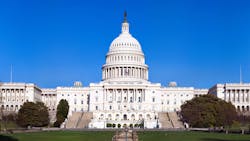Continuing Resolution would extend expiring surface transportation programs by one year
Update 9/22/2020, 9:00pm: The U.S. House of Representatives voted and passed a slightly revised version of the Continuing Resolution. The legislation now moves to the Senate.
The U.S. House Committee on Appropriations introduced a Continuing Resolution Sept. 21 that would provide a short-term budget extension to keep the federal government funded through Dec. 11, 2020. The legislation also includes a one-year extension of surface transportation authorizations that were set to expire on Sept. 30.
According to analysis performed by the American Public Transportation Association (APTA), the surface transportation extension in the bill authorizes at least $12.6 billion for public transit investment and includes other transit priorities:
- Authorizes public transit funding for FY 2021 at amounts equal to the FY 2020 authorization as provided by the FAST Act (P.L. 114-94) and distributes the funds in the same manner as the prior year;
- Prevents a $6 billion (or 60 percent) across-the-board cut of FY 2021 transit formula funds to each public transit agency by prohibiting application of the Rostenkowski Test;
- Deposits $3.2 billion in the Mass Transit Account (MTA) of the Highway Trust Fund to ensure that the MTA will not run out of funds and FTA will be able to process grants in the upcoming fiscal year; and
- Extends the authorization for transit-oriented development (TOD) projects for Railroad Rehabilitation and Improvement Financing (RRIF) loans and loan guarantees (which expires Sept. 30, 2020) to Sept. 30, 2021.
Chairman of the House Committee on Transportation and Infrastructure Peter DeFazio (D-OR-4) noted that while it was his hope to reach an agreement on a “modern, multi-year surface transportation bill,” of higher importance is providing certainty to states and local governments experiencing financial duress from the pandemic and other factors.
“With this one-year extension in place, we can continue work on a long-term, transformational bill that significantly boosts investment in our surface transportation network and moves our transportation systems into the 21st century,” said Chair DeFazio.
The committee’s Ranking Member Sam Graves (R-MO-6) added the bill could also prevent further disruptions to those employed in infrastructure jobs.
“As many stakeholders continue to navigate the impacts of the COVID-19 pandemic, ensuring that states are capable of planning and executing infrastructure projects and preventing any disruptions to the 2021 construction season will keep Americans on the job rebuilding our infrastructure,” said Rep. Graves.
APTA President and CEO Paul Skoutelas echoed the importance of certainty regarding FY 2021 transit funding that would come from the bill being enacted but continued to emphasis more is needed for the transit industry.
“The introduction of this bill is critical to the industry and it will provide certainty to capital programs. Congress still needs to address the dire situation faced by public transportation systems large and small, from coast-to-coast,” said Skoutelas. “As ongoing COVID-19 emergency funding conversations occur on Capitol Hill, APTA implores both chambers of Congress and the administration to provide at least $32 billion in critical federal support to enable the industry to survive during this unprecedented pandemic. We continue to serve essential employees every day, but without additional emergency funding, many transit agencies will soon need to cut transit services and routes and furlough transit workers, leaving our communities without service and jobs when they need us most.”
The House is expected to vote on the legislation this week and Speaker Nancy Pelosi said stop-gap budget bill would “avert a catastrophic shutdown in the middle of the ongoing pandemic, wildfires and hurricanes.” However, the bill has already received push back via social media from Senate Majority Leader Mitch McConnell who said the bill left out support for farmers.
The bill needs to move through both houses of Congress and the president must sign legislation by Sept. 30 to avoid a government shutdown.
About the Author

Mischa Wanek-Libman
Group Editorial Director
Mischa Wanek-Libman is director of communications with Transdev North America. She has more than 20 years of experience working in the transportation industry covering construction projects, engineering challenges, transit and rail operations and best practices.
Wanek-Libman has held top editorial positions at freight rail and public transportation business-to-business publications including as editor-in-chief and editorial director of Mass Transit from 2018-2024. She has been recognized for editorial excellence through her individual work, as well as for collaborative content.
She is an active member of the American Public Transportation Association's Marketing and Communications Committee and served 14 years as a Board Observer on the National Railroad Construction and Maintenance Association (NRC) Board of Directors.
She is a graduate of Drake University in Des Moines, Iowa, where she earned a Bachelor of Arts degree in Journalism and Mass Communication.
